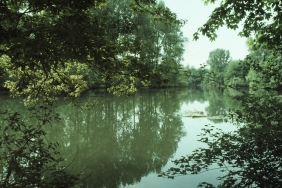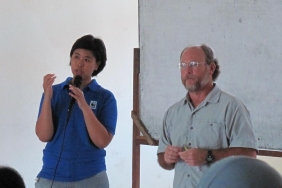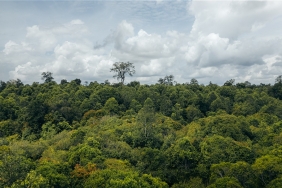THE HABITAT OF BORNEO PYGMY ELEPHANTS THREATENED BY TWO INDUSTRIAL PLANTATION COMPANIES
Nunukan, East Kalimantan, February 28, 2013.
The Bornean Elephant (Elephas maximus borneensis) habitat area in Tulin Onsoi Subdistrict, Nunukan Regency, which is in the Heart of Borneo, is threatened with conversion to rubber, jabon and sengon plantations. Two HTI (Industrial Plantation Forest) companies, PT Borneo Utara Lestari (PT BUL) and PT Intracawood Manufacturing (PT IWM), have obtained principle licenses and are currently conducting Environmental Impact Assessments (AMDAL) for the HTI business license process.
"The issuance of HTI licenses in elephant habitat areas will have a negative impact on local communities. If the area is cleared, wild elephants will lack natural food. As a result, elephants will look for food in community settlements, triggering conflict," said Agus Suyitno, WWF-Indonesia East Kalimantan Program Officer for Elephant-Human Conflict Mitigation. "Human-elephant conflicts have started to occur since 2005, so the HTI development will only exacerbate the conflict and should be stopped or its permits canceled."
"The company's AMDAL must match the facts on the ground. Even though it is in the Forestry Cultivation Area (KBK), if the field conditions are in the elephant habitat, the area should not be opened, the risk is great and the cost is high," said Santifil Oslo, Tulin Onsoi sub-district head.
IUCN classifies the Borneo pygmy elephant as endangered. Research conducted by WWF-Indonesia and the East Kalimantan Natural Resources Conservation Agency (BKSDA) from 2007-2012 estimated the pygmy elephant population to be in the range of 20-80 individuals. Borneo elephants are called 'pygmy' because their body size is relatively the smallest among other elephant subspecies in the world. The Dayak Agabag people of Tulin Onsoi call this elephant "Nenek". They consider this animal a sacred animal that should not be disturbed or antagonized.
Ilay, the deputy head of the Sungai Tulid adat group - one of the areas where Kalimantan's pygmy elephants roam - said, "We firmly reject the clearing of the area, because it also contains our customary forest. If our forest is cleared again then 'Grandma' will be angry and will often come to the village, eating our crops."
For more information, please contact:
Wiwin Effendy, Coordinator of WWF-Indonesia East Kalimantan Program
Email: weffendy@wwf.or.id, Hp: +628125859265
Agus Suyitno, Human-Elephant Conflict Mitigation Officer, WWF-Indonesia East Kalimantan Program Email.
Email: asuyitno@wwf.or.id, Hp: +6282157779933
Note To Editor:
Maps and photos related to the analysis of elephant habitat overlapping with two HTI companies in Tulin Onsoi District, Nunukan, can be accessed at https://www.dropbox.com/sh/qj60h7jhgagad04/lhxCcSyQbd .





